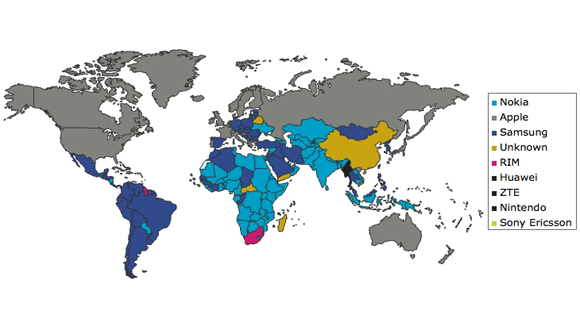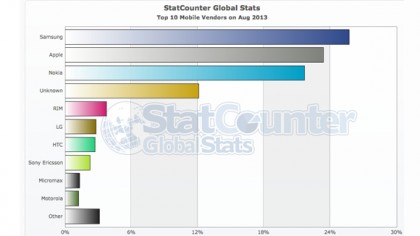Samsung shores up its internet usage lead among devices vs Apple

Hurry up and launch that iPhone 5C already. Samsung has extended its lead vs Apple when it comes to internet usage on their respective devices, particularly in emerging markets.
Samsung mobile devices captured 25.7% of global internet usage in August, leaving Apple with 23.4%, according to web analytics firm StatCounter.
Nokia, the former leader as of last December, has faded to third place at 21.7%.
The interesting thing is that while Apple still dominates in key areas like the U.S., U.K., and Australia, it's being lapped in entire continents like Asia, South America and Africa.

Samsung vs Apple stats breakdown
Apple is doing just fine in the U.S., maintaining its lead of 52.2% vs Samsung's 19% of internet usage among devices.
Nokia's numbers, previously propped up by feature phones, have fallen to a measly 1.5% in the U.S.
In the U.K., it's almost the same deal. Apple users are surfing the web at a rate of 46.8% compared to 21.5% for Samsung. Nokia is holding onto 3.7%.
Sign up for breaking news, reviews, opinion, top tech deals, and more.
But when it comes to emerging countries like India, Samsung is more than making up for these losses with a 26.7% share of internet usage.
Apple has a paltry 1% share of India's mobile usage, according to StatCounter.
iPhone 5C to the rescue
Apple could blunt the impact that Samsung and its Galaxy devices have had on the iPhone by launching a cheap iPhone model alongside the iPhone 5S.
"Over the past 12 months Apple has increased its share in the US and UK but globally there is an on-going battle taking place between it and Samsung," said StatCounter CEO Aodhan Cullen in a press release today.
"Should the rumors prove true, it will be fascinating to see if a less expensive iPhone will help it increase market share against lower cost competitors in global markets."
Another factor the web analytics firm pointed out was Microsoft's purchase of Nokia's handset business, bringing more weight to the third-place contender, which still leads in Asia and Africa.
